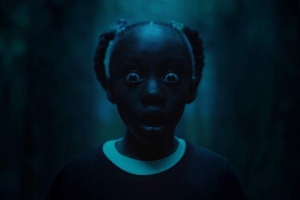
If there were any lingering doubts as to Jordan Peele’s skill behind the camera, the opening minutes to Us puts them firmly to bed. Set in 1986 Santa Cruz, we follow a young girl on vacation with her parents, wandering through a an amusement park-illuminated boardwalk. Said girl is separated from her parents, whereupon she wanders into a hall of mirrors, where she finds…let’s call her a bad reflection. As you may have seen in the trailer, she grows up, marries, has two children, and goes back to that same beach, where they are all menaced by a whole family of bad reflections.
But back to the carnival; that first sequence is masterful. The movement of the camera both accentuates the size and unfamiliarity of the girl’s surroundings, and pushes in, giving the place a tight, almost claustrophobic feel. The sound design is perfect, expertly capturing the disorienting nature of all amusement parks everywhere. We are right there with the girl, being pulled into that awful funhouse of mirrors, and like her, we don’t like what we see. But we can’t turn away.
For his sophomore feature, Jordan Peele creeps along, the film at times seeming to move at a deliberate snail’s pace, forcing us to wait for the fireworks factory. Whereas Get Out was a perfect slow-burn thriller (its screenplay win at the Oscars was very well deserved), Us occasionally feels scattershot, jumping around in fits and starts all while displaying a mastery of the craft. While the pacing isn’t always up to snuff, the individual scenes are never less than wonderful; anyone who saw the masterful 2015 psychological horror The Gift will remember how that film expertly took advantage of both the foreground and background, using little details to mine extra tension. Us does this brilliantly as well, crafting scenes with such skill that you’d swear he’s been making films forever.
Us is way more of a horror film that Get Out, which was itself more of a thriller (though genres are, obviously, stupid and reductive). Us is also probably less of a social commentary than Get Out, at least in terms of having a clear, easily-digestible message. I feel like I need to see it a second time in order to parse out what it all means. Also, I really, really want to see it a second time just anyways. This is a film made with such a passion for horror, someone with a deep love for the genre.
If Us isn’t quite as clear and groundbreaking as Get Out, it’s always entertaining in the moment. I’m very curious to see what others think the film “means”; I’ll confess that it’s not quite as clear to me as Get Out was, the meaning of which hit me like a punch in the gut. Here, it could be any number of things things, and it occurs to me that it might actually be more vague on purpose; while the film certainly offers up a couple of potential underlying themes (the title itself might be a big clue), I imagine that this is something that will be argued about and debated indefinitely. That’s not a bad thing.
As much as the directing stands out, this is definitely an actor’s movie. Lupita Nyong’o won the Oscar for 12 Years a Slave and provided the moral compass for Black Panther (lowkey, she’s the smartest person in that movie), and I was hyped beyond belief to see her tear up a horror flick. She does not disappoint. So good is she, in fact, that I feel comfortable in predicting that the Oscars will completely ignore her (it happened to Toni Collette, probably the best all-around performance in a movie last year). Winston Duke, her Black Panther co-star, captivates the screen with his charisma, creating the kind of dad I feel like we’ve all met. His comic timing is perfectly delivered and deployed. Shahadi Wright Joseph and Evan Alex play their children, and they are both wonderful; one of the best scenes in the entire film has the four of them arguing at a dinner table, and through the dialogue and direction we are shown glimpses into their minds, their insecurities, their strengths.
There is some unforgettable imagery in this movie. As can be expected in a story about doppelgängers, the idea of doubles and mirrors is quite prevalent. Near the beginning of the film, we see a doomsday prophet with a cardboard sign with a quote from Jeremiah 11:11, Later, our attention is drawn to a digital clock where the time is 11:11. Soon after, the dad watches sports on TV, where the score is 11 to 11. When the Wilsons go to the beach, they meet up with another family, and it’s interesting to see them as even more of a broken mirror image than the doppelgängers. And I’ll just say this: there was a “Hands Across America” flyer in my old kindergarten classroom, the one where everyone’s holding hands and circling the globe. I will NEVER look at that the same way again.
I can definitely see being underwhelmed by Us. It’s an imperfect, confounding, at times frustrating film to get a handle on. But I really got into it, appreciating the crazy wavelength it operated on, as well as how Jordan Peele was taking deliberate steps to expand from his previous film. Whatever else, it’s a film I’ll be puzzling over for a long time coming.
